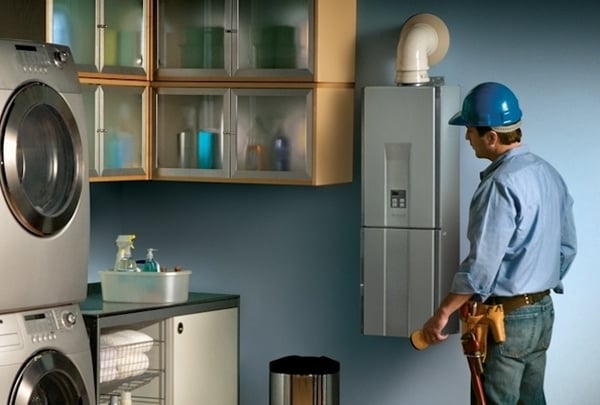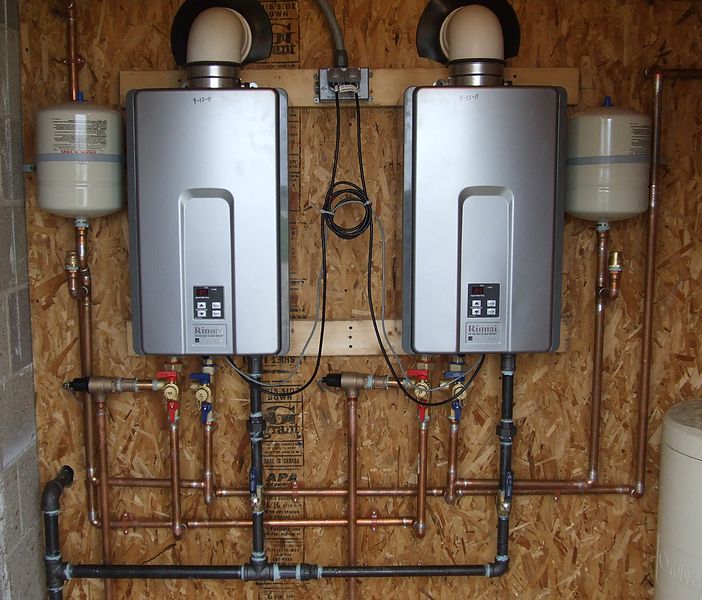What are your opinions about Six Benefits of a Tankless Hot Water Heater?

In a globe where convenience and efficiency reign supreme, it's no surprise that house owners are constantly in search of smarter ways to manage their home's energy consumption and comfort. One development that has continuously obtained popularity is the tankless water heater. But just what makes these systems stand out from the traditional tank-based designs most of us grew up with? Let's dive in and check out the advantages of tankless water heaters, aiding you make a decision if it's time to make the switch in your house.
Introduction
Picture this: you enter the shower after a lengthy day, anticipating a calming cascade of warm water, only to be greeted by icy beads due to the fact that the last individual used it all up. Noise familiar? Conventional water heaters keep a set quantity of hot water, meaning you go to the mercy of that tank's supply. Tankless systems, on the other hand, warmth water on demand. No more going out mid-shower, no more fumbling with timetables simply to guarantee hot water is available.
Comprehending Tankless Water Heaters
What Are Tankless Water Heaters?
Tankless water heaters, occasionally known as on-demand or instant water heaters, supply warm water only as it's needed. Instead of saving gallons of pre-heated water, these units kick right into activity the moment you turn on the faucet. Water goes through a warm exchanger, heating up in real-time, suggesting you get a continuous flow of warm water without the requirement for a huge storage tank sitting idly by.
Just how Do They Differ from Standard Equipments?
Standard heating units hold a storage tank of hot water, making use of energy to maintain that container at a constant temperature level. Tankless devices eliminate the standing supply, lowering lost power and the bulky footprint of a big cylinder. Basically, you're upgrading from a "stockpile" way of thinking to a "made-to-order" approach.
Common Types of Tankless Systems
Tankless water heaters normally can be found in 2 ranges: gas and electric. Gas versions often tend to supply greater flow rates, ideal for larger houses, while electric models often offer smaller homes and are generally less complicated to mount. In addition, some systems are designed for point-of-use (offering one fixture) while others can take care of the entire home's warm water demands.
Secret Advantages of Tankless Hot Water Heater
1. Endless Warm Water Supply
Ever had to schedule showers so every person obtains their reasonable share of warm water? With tankless, that ends up being a thing of the past. As long as the heating system's flow capacity isn't gone beyond, you can take back-to-back showers without becoming a popsicle.
2. Power Efficiency and Expense Cost Savings
Say goodbye to warming a titan container's well worth of water and maintaining it toasty all the time. Tankless heating systems lower standby energy losses, which can lower utility expenses. While the initial price might be higher, the long-term cost savings usually justify the financial investment.
3. Space-Saving Style
If your home is short on storage, getting rid of the large tank maximizes important room. Tankless systems are compact and can commonly be installed on walls, stashed in corners, or set up in limited utility storage rooms without gobbling up the whole room.
4. Longer Life-span
A well-maintained tankless water heater can outlast its tank-based relative. Typical tanks may last 10-15 years, while tankless versions can maintain downing along for two decades or more, making them a solid financial investment gradually.
5. Improved Water Quality
Saving water in a storage tank can in some cases cause debris buildup or a slightly "off" taste. With tankless systems, fresh water is heated up on the spot, lowering the opportunities of debris accumulation and possibly supplying cleaner-tasting water.
Factors to consider Prior To Changing
Though the advantages are compelling, it's a good idea to consider a few variables prior to completely devoting.
First Financial Investment Expenses
Tankless heaters normally come with a higher ahead of time price. In between the system itself and prospective installation modifications, the initial price may give you sticker shock. Yet keep in mind to watch it as a lasting financial investment.
Installation Demands
Relying on your home's infrastructure, you may need added electrical capacity or gas line upgrades. Guarantee you recognize the setup needs and speak with an expert to avoid surprises.
Reviewing Your Home's Water Use Patterns
If your household at the same time utilizes several components with high warm water demand, make sure the unit's flow price fulfills your demands. Recognizing your use patterns assists you choose the best size and kind of tankless heating unit.
Maintenance and Treatment Tips
Tankless systems are fairly low upkeep, but they aren't set-it-and-forget-it appliances.
Routine Cleaning and Descaling
Difficult water minerals can develop in the heat exchanger, impacting efficiency. Routine descaling (frequently advised annually) maintains the device going for peak performance.
Annual Professional Examinations
A yearly checkup from an expert makes certain minor concerns are caught early. They'll examine the device's performance, try to find leaks, and assist keep optimal efficiency.
Making Sure Proper Ventilation
For gas designs, appropriate air flow is vital to securely expel exhaust gases. Make certain venting systems are clean and appropriately mounted to stop any prospective security risks.
Comparing Different Brands and Models
Not all tankless water heaters are developed equal.
Looking Into Trusted Makers
Look for reputable brands with a background of creating high quality devices. A trusted supplier commonly offers better client support and longer guarantees.
Reading Evaluations and User Responses
User evaluations and responses from neighbors or pals who have gone tankless can supply important understandings. Often, real-life experiences can be much more informing than advertising pamphlets.
Installment: DIY or Specialist?
While some homeowners delight in tackling tasks themselves, tankless installation may not be the most effective time to break out the toolbox.
Advantages and disadvantages of DIY Installment
A do it yourself set up might save money, but it features risks. Incorrect setup can result in ineffectiveness or safety and security concerns. If you come in handy and have experience, it could be possible-- but proceed with care.
When to Call a Specialist Plumber
For most, calling a professional makes certain every little thing's done appropriately. A specialist plumbing technician comprehends local codes, sizing needs, and airing vent specifications, minimizing the threat of problems.
Maximizing Performance
You have actually purchased a tankless system-- now optimize its effectiveness.
Optimal Temperature Level Setups
The majority of people set their devices between 120-140 F. Adjusting the temperature level can improve comfort and cost savings. Experiment to discover a pleasant area that does not lose power.
Coupling With Low-Flow Fixtures
Want to extend your device's capabilities? Consider installing low-flow showerheads and taps. They lower water usage, allowing your tankless system to deliver a consistent stream of hot water without straining.
Ecological Impact
Tankless hot water heater align with greener living objectives.
Reduced Carbon Impact
By using less energy and just home heating water as required, tankless systems can reduce your home's carbon impact, lowering your ecological effect.
Conserving Natural Resources
Less power usage and less squandered warm water translate right into fewer natural deposits being utilized, an ecological win-win.
That Profits Most from Tankless Heaters?
The beauty of tankless heaters is that they can suit a range of families.
Huge Households vs. Single Passengers
Big households could enjoy the countless warm water supply, while solitary owners value the energy savings from not heating a whole storage tank for just someone's morning shower.
Property Owners with Minimal Area
If your home is short on square video, shedding the bulky storage tank liberates space for other basics-- or maybe just extra breathing space.
Eco-Conscious Consumers
Going tankless aligns with eco-friendly worths, ensuring you're not squandering energy or sources.
Future Fads in Tankless Hot Water Heater
The globe of home devices is ever-evolving, and tankless hot water heater are no exemption.
Smart Home Combination
Imagine readjusting your hot water heater's temperature by means of an application or getting maintenance informs on your phone. As clever home technology advances, we'll see even more connectivity and benefit.
Advancements in Technology
R&D is constantly enhancing heat exchangers, making systems extra reliable and long lasting. Future versions may be even quieter, a lot more compact, and far better suited for varying climates.
Conclusion
Choosing a tankless water heater is greater than just upgrading your home's hot water system; it's investing in long-term convenience, power effectiveness, and a greener way of life. By considering your household's water usage, being mindful of installment demands, and committing to regular upkeep, you can delight in a constant stream of hot water without the baggage of a large container. As modern technology progresses, you can look forward to also smarter, more reliable tankless options that not only make your life simpler however additionally profit the world.
Why You Should Consider a Tankless Water Heater for Your Home
Energy Efficiency and Cost Savings
Tankless water heaters, also known as on-demand water heaters, heat water only when needed. This means they don't waste energy keeping a tank of water hot constantly. This efficiency translates into substantial cost savings on your monthly energy bills.
Endless Hot Water Supply
One of the significant advantages of tankless water heaters is their ability to provide a continuous supply of hot water. Traditional tank water heaters have a limited capacity and can run out of hot water, especially during peak usage times. In contrast, tankless water heaters can provide an endless stream of hot water, making them ideal for larger families or homes with high water usage.
Space-Saving Design
Tankless water heaters are compact and take up significantly less space compared to traditional tank heaters. They can be installed on walls, under cabinets, or even outside, freeing up valuable space in your home. This makes tankless water heaters a great option for smaller homes or properties with limited space for a traditional water heater.
Longer Lifespan and Lower Maintenance
Tankless water heaters typically have a longer lifespan compared to traditional tank heaters. They can last up to 20 years or more with proper maintenance. Additionally, tankless systems are designed with replaceable parts, which can extend their lifespan further and reduce long-term maintenance costs.
Environmentally Friendly
Reducing energy consumption not only saves you money but also benefits the environment. Tankless water heaters contribute to a smaller carbon footprint by using less energy to heat water. Their energy efficiency and ability to minimize standby heat loss make them an eco-friendly choice for environmentally conscious homeowners.
Customized Temperature Control
Tankless water heaters offer precise temperature control, allowing you to set the desired temperature to meet your specific needs. This level of customization ensures you always have water at the perfect temperature for your comfort and usage requirements.
https://beantownservices.com/blog/consider-tankless-water-heater-for-your-home

As a keen person who reads about Pros and Cons of Tankless Water Heater, I thought sharing that excerpt was a smart idea. Sharing is good. Helping others is fun. We love your readership.
Schedule Free Estimate